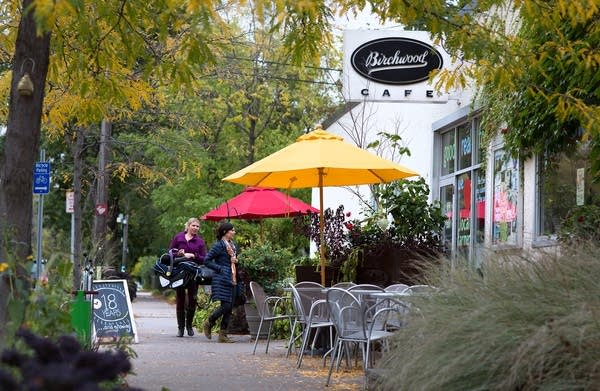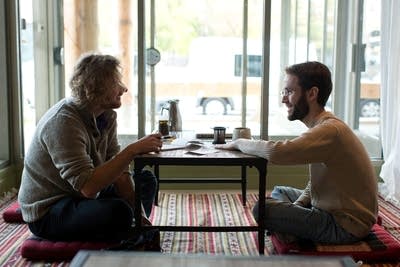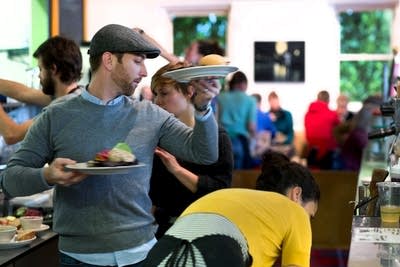Appetites: Minneapolis' Seward neighborhood becomes a culinary destination

Go Deeper.
Create an account or log in to save stories.
Like this?
Thanks for liking this story! We have added it to a list of your favorite stories.
The Seward neighborhood in Minneapolis has long been known for its diversity, its progressive politics, and the co-op and cafe that bear its name. But it's increasingly becoming known for a place to get a great bite to eat. James Norton, editor of Heavy Table, joined MPR News' Steven John to talk about the neighborhood's eats.
• Photo gallery: A Minneapolis foodie enclave
STEVEN JOHN: A lot of folks in the greater Twin Cities probably don't much about the Seward neighborhood, let alone that it is a destination for good eating. Is it, really?
JAMES NORTON:I'll make the case. Seward's rep as a place where you'll get a hemp-bread and sprouts sandwich and Fair Trade coffee served with vegan creamer isn't wrong — it just isn't really complete anymore.
Turn Up Your Support
MPR News helps you turn down the noise and build shared understanding. Turn up your support for this public resource and keep trusted journalism accessible to all.
The neighborhood's core ideals of knowing where food comes from and how it got to our plates are reflected nearly anywhere you eat, but there's an increasing sophistication about flavor and variety that is making it a great place to dine.

Take Tracy's Saloon for example. It was, until recent times, sort of a sleepy working class neighborhood bar. It was overhauled in 2006 and has become a really remarkable compromise between the old and the new — you can get a burger and a beer, or you can get a really excellent house curry on lemon rice. It's fast becoming one of my favorite chill-out restaurants in Minneapolis.
JOHN: Seward's Birchwood Cafe has also grown its reputation beyond just a neighborhood eating spot in their almost two decades in operation.
NORTON: Very much so. The Birchwood is poised to launch a major crowdsourced funding campaign on Kickstarter — they're seeking $100,000 over the course of 29 days — in order to renovate and reboot the restaurant.

JOHN: That seems like an ambitious goal. What precisely are they hoping to do with the money?
NORTON: It's extremely ambitious, but also not unrealistic. Local restaurant watchers know that the guys who run Travail in Robbinsdale were able to raise a quarter million dollars with their campaign to "democratize fine dining," which demonstrates what a good pitch for a restaurant with a strong, enthusiastic clientele can accomplish. Travail proved that they were about more than just selling food — Birchwood can credibly make a similar claim.

If they make their goal, Birchwood is going to expand their tiny kitchen, which is regularly overwhelmed during Sunday brunch, add some seriously environmental improvements including a rain garden and a solar panel array, expand their dining room, and — if they can swing the licensing — add a vestibule entryway to keep out cold weather. It should be a real boost for the neighborhood.
JOHN: Let's talk about the Seward Co-op, which has been around for more than 40 years now. Is it still a neighborhood mainstay?
NORTON: More than that, if that's possible. They've been booming. If you've tried to park in Seward Co-op's lot any time over the past year or two, you know they're doing well. It's not quite as ridiculous as the situation over at the Wedge, but it's getting there. The co-op's new location has been exceeding its own revenue projections since opening its doors in early 2009, to the extent where they're planning to open a second location in the Powderhorn neighborhood a few years from now to help balance the demand for their food and philosophy.
JOHN: Now, it's not all good news on the Seward culinary front, I understand.

NORTON: Unfortunately, no. The long decline of True Thai restaurant ended early this month with the restaurant's closure. At the height of their powers about five years ago, they were regularly winning citywide "best of" awards, but they faced a number of challenges including the tragic hit-and-run death of their chef Anousone Phanthavong in 2011. He was the pedestrian in the Amy Senser trial that garnered so much publicity.
JOHN: So, what do you think the future holds for dining out in the Seward neighborhood?
NORTON: Operating in Seward Co-op's old location is a teahouse called Verdant. It's less a tea house than a flavor laboratory — the stuff they're doing with kombucha, housemade Sweet Science ice cream, soba noodles, chai and more is knocking my socks off. It's one thing to have a clever idea, but quite another to follow through, and they're doing both.







